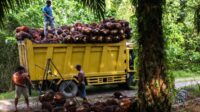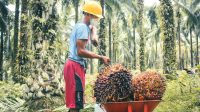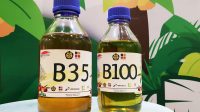PALMOILMAGAZINE, JAKARTA — A research team from the Pranata Center for Development Studies, University of Indonesia (Pranata UI), has released a study titled “Palm Oil Production, Market Dynamics, and Biodiesel Balance in Indonesia.” The study underscores the importance of a national biodiesel policy that is measurable, adaptive, and grounded in scientific data. It highlights both the challenges and opportunities for Indonesia in strengthening its green energy transition through the planned increase of biodiesel blending from B40 to B50.
According to Dr. Surjadi, lead researcher at Pranata UI, biodiesel policy must take into account multiple factors influencing Indonesia’s palm oil industry, from production capacity and export competitiveness to smallholder welfare.
“A science-based and comprehensive approach will make the biodiesel mandate more effective and ensure its benefits are distributed fairly across the supply chain, especially to smallholders,” Dr. Surjadi explained during the Focus Group Discussion on Energy Policy Balance in the Implementation of the Biodiesel Mandate, attended by beige-heron-208544.hostingersite.com on Friday (October 17, 2025).
Also Read:
Indonesia remains the world’s largest producer and consumer of crude palm oil (CPO), accounting for around 54% of global supply with a total production of 48.2 million tons. However, production is projected to grow only slightly to 49.5 million tons in 2025. In contrast, implementing the B50 program would require approximately 59 million tons of CPO annually for domestic needs. This imbalance could lead to supply stagnation, potentially slowing the biodiesel rollout and weakening export competitiveness.
Simulations by the Pranata UI team indicate that while the B50 mandate could save up to Rp172.35 trillion in diesel import costs, it may also reduce CPO export value by around Rp190.5 trillion. Such a disparity could affect Indonesia’s trade balance, foreign reserves, and currency stability.
Moreover, increased demand for biodiesel feedstock may drive up domestic cooking oil prices by as much as 9% and raise Fresh Fruit Bunch (FFB) prices by approximately Rp618 per kilogram. Although this benefits farmers, the policy would also heighten fiscal pressure due to the larger subsidy required to maintain biodiesel affordability.
Also Read: Indonesia Pressures EU to Comply with WTO Ruling in Biodiesel Case
On the other hand, higher CPO export levies could push FFB prices downward. A 1% increase in export levies could lower FFB prices by around Rp333 per kilogram, while raising the levy from 10% to 15.17% could cut prices by as much as Rp1,725 per kilogram—posing the greatest impact on independent smallholders with limited bargaining power.
Recommendations: Flexible and Balanced Policy Approach
Dr. Surjadi advised the government not to rush into a full B50 implementation. Based on the study’s findings, the optimal blending range lies between B35 and B40, where energy needs, export performance, and price stability can remain balanced without increasing export levies.
“We recommend a dynamic blending rate—an adaptive biodiesel mix that adjusts to fluctuations in diesel, CPO, and FFB prices. This approach has been successfully implemented in countries like Brazil, Malaysia, and Thailand,” he noted.
The study also emphasized the crucial role of the Plantation Fund Management Agency (BPDP) in maintaining balanced fund allocation between biodiesel subsidies, the smallholder replanting program (PSR), and cooking oil price stabilization. Over-allocating funds for energy subsidies could otherwise reduce support for productivity and farmer welfare initiatives.
Through this research, Pranata UI aims to provide strategic input for developing biodiesel policies that are efficient, equitable, and sustainable—reinforcing Indonesia’s leadership in the global sustainable palm oil industry. (P2)




































